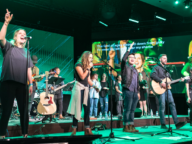About a month into the COVID pandemic, I did a “worship music fast.” To “fast” means to voluntarily stop doing something for spiritual reasons. So for about two weeks, I stopped listening to worship music in order to reorient my faith and make sure that God had a healthy, and right, place in my life.
Fasting worship music
Worship music was such an interesting thing to fast from, especially for me (a worship leader). As someone who listens to worship music for most hours of the day and loves it, this was both a weird thing and a hard thing. Yet, I realized a pattern; I was slowly substituting listening to worship music for my time being present with God. Listening to worship music became an idol––something upon which I was placing higher importance than even God himself.
Often the songs within the worship music genre are written and produced specifically for congregational context. What I love about worship music is the way it brings God’s people together to lift up songs of praise to Jesus, who is absolutely worthy of all our worship. One of my favourite verses comes from Psalm 133:1, where the psalmist says, “How good and pleasant it is when God’s people live together in unity.” One main thing worship music does is to practically express this beautiful truth of the unity of God’s people in gathering together to sing.
However, as all of us are aware, COVID-19 has hindered us from gathering physically to sing these songs. We have been brought back to our homes and have transitioned into a season of online gathering. We are “gathered” theoretically, but are still separated physically, hindering these songs from being sung together.
Personally, once the pandemic started, I listened to worship music constantly, because I missed these gatherings. Therefore, with one song after another stacking up into hours of mindless listening, the music slowly became noise. I was listening to worship music not to draw close to God, but to relive these congregational experiences that are now of the past.
What the silence revealed
As I began my listening fast, it became awfully and uncomfortably quiet. My “quiet times” have become ACTUALLY quiet. This place of silence was a hard place to be in, because I knew that I had to come face-to-face with the deeper, uncomfortable things going on in my heart.
However, in the discomfort of the silence, I knew God had finally gotten my attention.
With one song to another stacking up into hours of mindless listening, the music slowly became noise. I was listening to worship music not to draw close to God, but to relive these congregational experiences that are now of the past.
I was using worship music as a band-aid to the deeper issues of my heart. Yes, I believe wholeheartedly in the power of declaring truths over our lives. But, if we don’t know what we’re declaring truth over, then we are mindlessly blocking our hearts from what they really need to hear by what we listen to. It is important to truly know and understand that the gospel is Jesus, not the music, bringing us to God. Music is just a tool, but ultimately we can come to God because of Jesus.
I was allowing the endless listening of worship music to form me, but not in the way God intended. God wanted to draw me even deeper towards himself, and I needed to let go of the crutch of music for a season so that he could form me to become even more like Jesus.
I want to share with you some of the things I learned during my time of fasting from worship music:
1. It’s important to sit in silence.
In Psalm 46:10, the Lord says, “Be still, and know that I am God; I will be exalted among the nations, I will be exalted in the earth.” This particular verse acted as a reminder to the psalmist during a difficult time, that the Lord is “an ever-present help in trouble.”
Sitting in silence is a way of submitting to the lordship of God by acknowledging that he is in control even in times of trouble. Instead of trying to find relief from our chaos by distracting ourselves, even with “Christian” worship music, sitting in silence WITH God becomes an act of worship where we surrender our ways to his. We can enter his presence freely and meet him even in our mess.
2. Hearing from God forms us.
As we sit in silence with God, and we face the storms in our heart,from our fears and worries to our deepest joys and longings, there is a particular delight in recognizing who God is as a holy God, and who we are as broken people. Therefore, when we bring to God a broken spirit before him, both the holiness and the grace of God are glorified, and our dependence on him increases; this is our act of worship.
Last fall, I made a small yet impactful change to my everyday life: I switched to an old 2005 brick, Nokia phone. Yes, it still exists. I made the switch because I realized that having a smartphone with constant connection to apps, the internet, and social media. was making it hard for me to hear God. To cap off this switch, it was also at this same time that I moved about an hour away by public transit from the Montreal P2C office. With that being said, yes, it was a quiet commute, but in quiet was where God spoke. In every hour of prayer, reflection, reading his Word and books that helped me grow closer with God, he spoke.
I’ve found these verses to be so true:
Blessed is the one
who does not walk in step with the wicked
or stand in the way that sinners take
or sit in the company of mockers,
but whose delight is in the law of the Lord,
and who meditates on his law day and night.
That person is like a tree planted by streams of water,
which yields its fruit in season
and whose leaf does not wither—
whatever they do prospers. (Psalm 1:1-3, NIV)
3. It’s good to listen to worship music, and it’s also good to listen to other music as well.
Music doesn’t have to be explicitly “Christian” for it to be good. For any music, whether it is labelled as “worship” or something else, these diagnostic questions can be really helpful:
- Is the music I am listening to helping me draw closer to God?
- Is the music a distraction from God, or a tool to see the love of God?
For example, one of the artists I’ve been listening to recently is Sleeping at Last, the artist for the musician Ryan O’Neal. He is a singer-songwriter and multi-instrumentalist who writes music about the various facets of life and the world, ranging from space and emotions to the nine Enneagram types.
One particular song that impacted me is a piece called “Three”, a song based on the Enneagram type Three. I, myself, am this enneagram type, which makes the song all the more special. Sleeping At Last composed the music in such a way that God used it to make a significant impact in my walk with him.
The song is mostly composed with piano and strings intertwining to form this beautiful ballad that communicates the longing of the Enneagram type Three to “rest” from performing in every aspect of their life. What the Enneagram type Three really longs for is to be fully loved and be good enough.
Through this song, though it does explicitly say it, I am reminded that I am both fully known and deeply loved by God, not because of how well I can perform, but because I am his son.
Check out Sleeping At Last here:
Join me in trying this
To conclude, I want to use this time to encourage you to give these a try:
- Shut off your device, whether it’s your phone, laptop, or tablet.
- Go into your room, go for a walk, or find somewhere else that’s quiet.
- Delight in God by thinking about how much he delights in you. Seek to hear from him.
- Respond in worship through a piece of music that helps you see more of the love of God, whether it is officially “worship music” or something else.
My prayer and encouragement for you is that you would see that Jesus is so much more than you could ever ask for, more than the music, more than the experience of it. I pray that, through your silence, you would find the fullness of joy in his presence.
[Editor’s Note: This article belongs to our series on “What forms us?” Of course, it’s ultimately God who shapes us toward Christ-likeness. But we hope these reflections encourage awareness and inspire intentionality in how we live. For more articles in this series, click the #whatformsus tag.]
"*" indicates required fields
Share this!
About the Author





